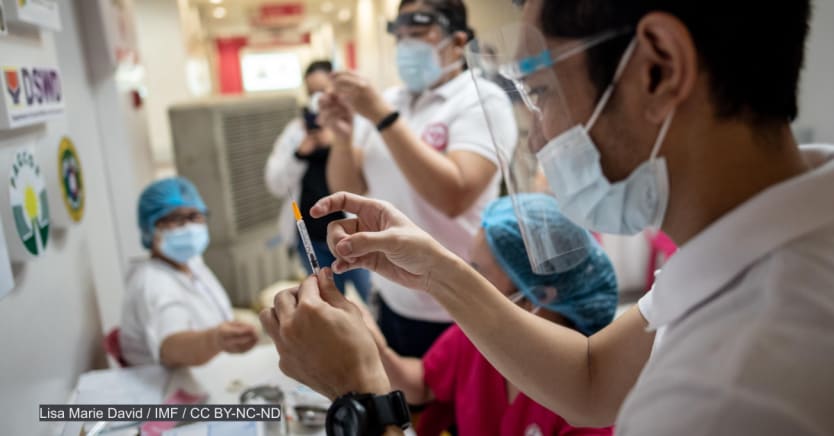
Applause for health workers is not enough. If we want the response to the next pandemic to be different, we must listen to health workers and take action to support them.
This week is World Health Worker Week. As we celebrate, many of us will reflect on front-line health workers’ tireless efforts over the past year to defeat COVID-19 — from community health workers communicating public health messages to doctors monitoring patients in ICUs.
And, yet, health workers have suffered greatly. More than 17,000 health workers have died from COVID-19, and thousands more are on the verge of burnout as overworked witnesses to unfathomable suffering and loss of life. Even before the pandemic, the world faced a shortage of 18 million health workers, mostly in low- and middle-income countries, as well as other health workforce challenges.
Still, health workers have rarely had a voice in local, national, and global forums, or projects and other efforts to shape better conditions for themselves and stronger policies toward health for all. So, while we pause this week to acknowledge health workers’ tremendous contributions and sacrifices, we must also forge a new way forward.
The Frontline Health Workers Coalition—an alliance of 38 U.S.-based organizations urging greater U.S. and global investment in front-line health workers, especially in low- and middle-income countries — calls for amplifying health worker voices in high-level policy forums and global health policy discourse and inviting them to the tables where policy decisions for health workers are being made.
“I am a nurse, and what I need is legislation that umbrellas the safety, protection, and adequate compensation of all nurses from the most basic ranks up to the heads. I speak on behalf of all other nurses who suffer a ton of workload because of being understaffed.”
— Karen Elouise Gijan Piga, nurse supervisor in the PhilippinesSo how can global health organizations and health workforce advocates chart a new way forward?
1. Include front-line health workers on boards and advisory groups.
Representation of front-line health workers in the governing and advisory boards of global health institutions makes policy dialogue more responsive to health workers and the populations they serve.
The Frontline Health Workers Coalition adds four new regional advisor positions for health workers from low- and middle-income countries to our steering committee and is now accepting applications.
We call on the Global Fund to Fight HIV, Tuberculosis and Malaria and The U.S. President's Emergency Plan For AIDS Relief through their annual country operational plan process, and other donors and investors to meaningfully engage health workers in policy and program planning.
U.S. Agency for International Development and other funders can also recognize country governments that include front-line health workers in high-level committees, and encourage other country partners to bring their perspectives — including those who have been historically under-represented, like women, nurses, community health workers, and indigenous people — into decision-making processes.
2. Consult front-line health workers to inform advocacy and policy work.
Organizations should continually seek the perspectives of front-line health workers who know best what they and their communities need to deliver safe, quality care. To inform our policy and advocacy work, the Frontline Health Workers Coalition and the HRH2030 Program invite health workers around the world to speak directly to the changes they would like to see through our #ApplauseIsNotEnough testimonial series officially launching this week.
We've already heard from Karen Elouise Gijan Piga, a registered nurse and nurse supervisor in the Philippines, who said, “I am a nurse, and what I need is legislation that umbrellas the safety, protection, and adequate compensation of all nurses from the most basic ranks up to the heads. I speak on behalf of all other nurses who suffer a ton of workload because of being understaffed.”
We’ll use Karen’s and other health workers’ recommendations in our advocacy to the U.S. government — including during a public briefing for Congress on Tuesday—and in our policy recommendations for the U.S. and other countries and donors.
3. Engage diverse front-line health workers in global health forums.
Opinion: 3 ways to support health care workers and strong health systems
Health care workers are the lifeblood of strong health systems. The Bihar Technical Support Program in India shows how improving the lives of front-line health workers can lead to better health outcomes for individuals and communities. CARE’s Manoj Gopalakrishna and Madhu Deshmukh explain.
Organizers of conferences, high-level meetings, and other global health gatherings should intentionally seek out front-line health workers as planners, moderators, and presenters and ensure that health workers have the appropriate space, support, and Internet connectivity to participate. With more remote meetings due to the pandemic, let’s build on this opportunity to bring in front-line health worker voices virtually, and eventually, in person.
For some of us, the beginning of the end of this pandemic feels like déjà vu. We celebrated health workers at the end of the 2014 Ebola outbreak in West Africa. Yet, little has changed in our decision-making, policies, and programming to include their voices and perspectives as we seek to protect and invest in them. This time health workers can’t wait. “Nothing for health workers without health workers” should always be our rallying cry. We invite you to join us and listen to health workers. World Health Workers Week is a perfect time to start.










